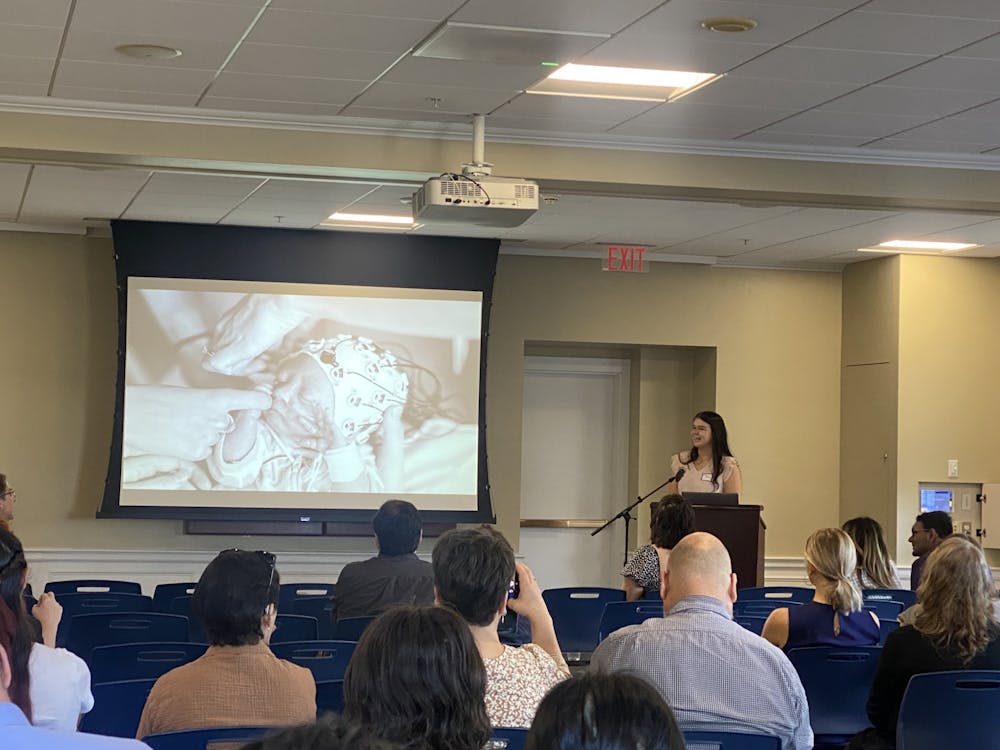The University hosted the 17th annual Reid Psychology Research Conference Friday to give undergraduate researchers at the University and seven other colleges an opportunity to present their ongoing research projects in psychology. Projects focused on a diverse range of topics including mental health, social relationships and neurodevelopmental disorders.
A total of 39 students — 30 University students and nine from visiting schools such as William and Mary, New York University and University of Delaware — participated across psychology, cognitive science and neuroscience majors to showcase their unique projects.
Chris Mazurek, director of undergraduate studies in psychology, led the conference. The keynote speaker, Angela Gutchess, Psychology Prof. at Brandeis University, discussed her research on the influence of age and culture on memory.
Lauren Breeden, research assistant in the Allen Lab and fourth-year College major, presented a project to fellow researchers and attendees studying how the quality of adolescent close friendships are linked to long term career outcomes.
“I think that the biggest thing I took from this [conference] was really learning all the working parts in research,” Breeden said.
While looking at literature, Breeden found a lot of information on the comparison between burnout and career satisfaction. She noticed how there was adjacent literature connecting social rejection from peers with less educational attainment, which inspired her to study attachment levels and friendship duration for a 13-year-old target participant. Breeden found that close peer reported friendship duration correlates with reduced feelings of burnout in adulthood.
Madison Monroe-Mohajerin, research assistant in the Developmental Neuroanalytics Lab and fourth-year College student, displayed her research project on the neurological and behavioral markers of Attention Deficit Hyperactive Disorder at four months old.
Monroe-Mohajerin’s Raven Fellowship-funded research, a competitive scholarship for undergraduate research offered by the Raven Society, began in the summer of 2022 and has been ongoing since then.
“My favorite part about the research process is the quantitative side, the data analytics side, and that's what made me want to pursue a PhD was when I was doing my third-year Neuroscience project,” Monroe-Mohajerin said.
Monroe-Mohajerin found that the more entropy, a measure of the randomness of a brain signal, an infant has, the fewer ADHD symptoms they have in childhood.
At the conference, Monroe-Mohajerin gave a talk to peers and faculty members, on the findings of her project and how she plans to continue this study with toddlers.
Madelyn Nance, research assistant in the Developmental Neuroanalytics Lab and fourth-year Cognitive Science major, focused her research on the connection between premature birth and development of Autism Spectrum Disorder in early childhood.
In Nance’s study, premature babies who were on ventilators, machines that move air into and out of the lungs of patients unable to breath on their own, had their brain activity measured in two settings. In the first, the baby was resting alone in a swaddle, and in the second, the baby was held by their parent or another caregiver.
Nance said these babies had higher levels of entropy on average, meaning more randomness of brain activity, during the condition in which they were in contact with another person, indicating that in a more social context babies processed information less efficiently.
“What really fulfills me is to connections I'm able to build with families … being able to give babies the ability to have a better life right from the start is what my passion is,” Nance said.
Breeden, Monroe-Mohajerin and Nance said that the research projects they presented have motivated them to continue working on these studies through graduate programs. They all agreed that mentorship from their professors and finding a project aligning with their interests was a fundamental part of their decisions to pursue graduate school for psychology research.







